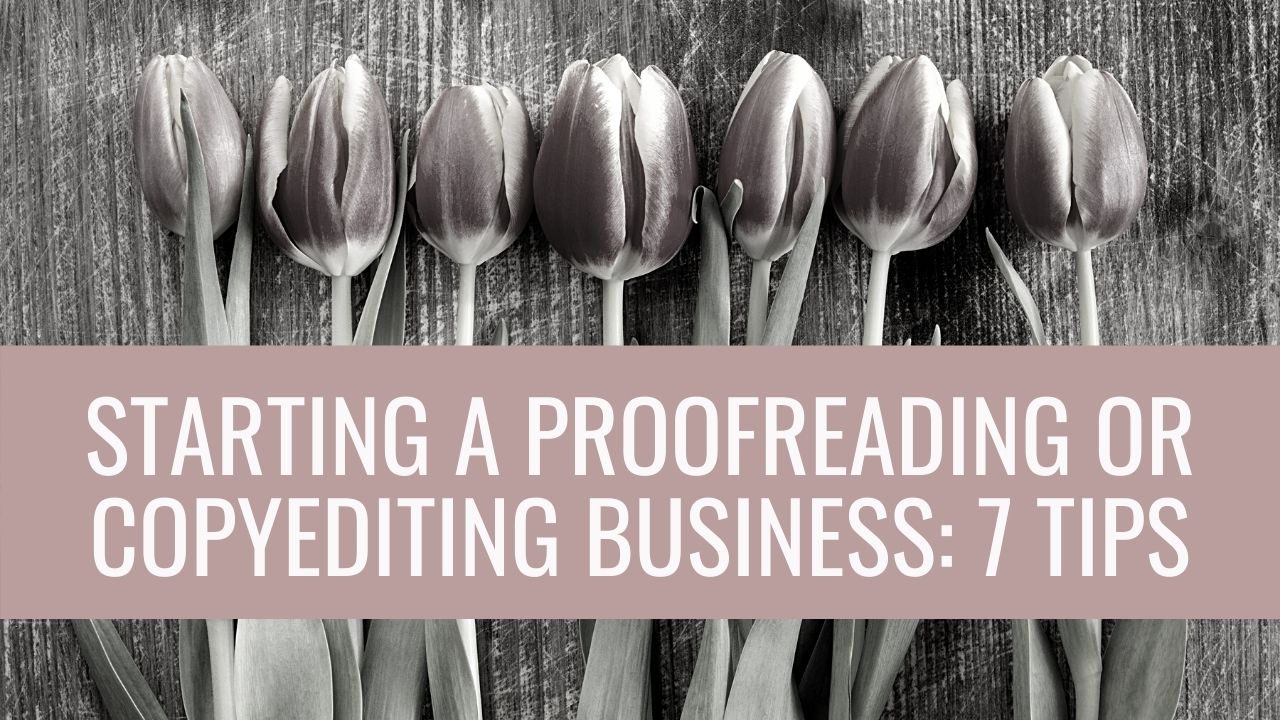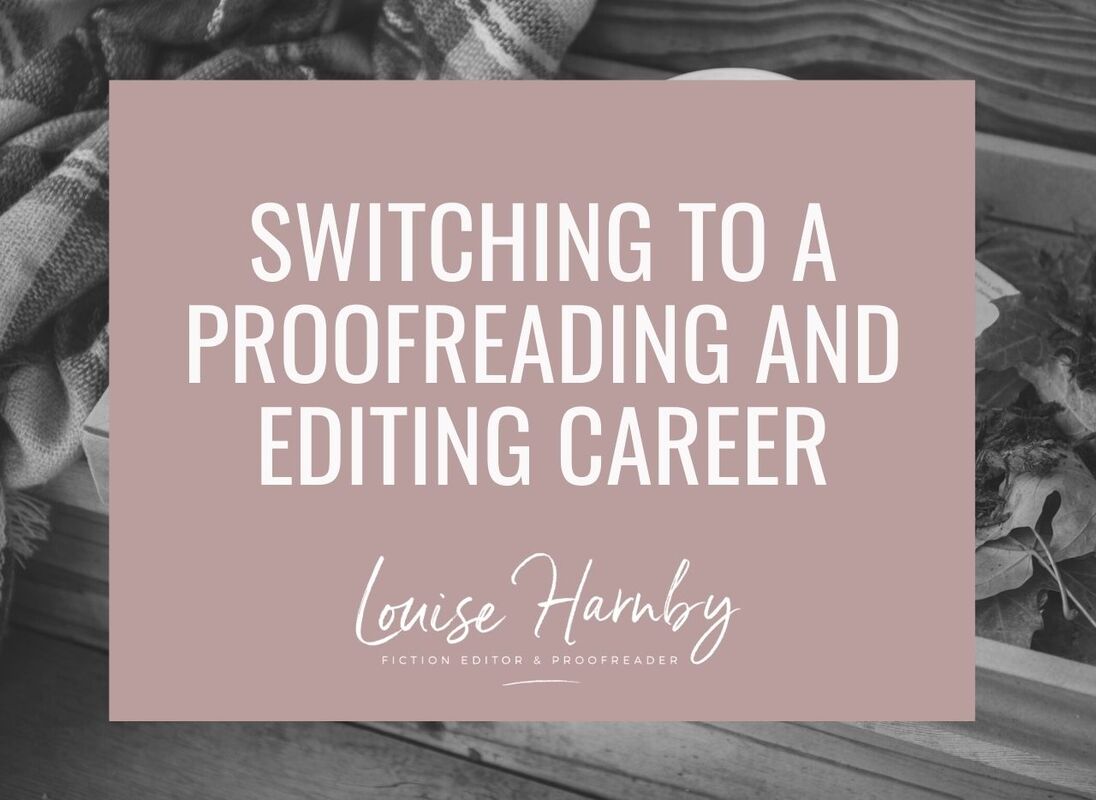|
BookMachine kindly invited me to write about proofreading and copyediting for independent authors who've already gone live with their book. In 'Post-publication editing for self-publishing authors', I discuss why some authors make the decision to work with editorial professionals post-publication, and how we might support them, all the while taking 'a tone that focuses on solutions, not criticism'. Louise Harnby is a fiction copyeditor and proofreader. She curates The Proofreader's Parlour and is the author of several books on business planning and marketing for editors and proofreaders. Visit her business website at Louise Harnby | Proofreader & Copyeditor, say hello on Twitter at @LouiseHarnby, or connect via Facebook and LinkedIn. If you're an author, you might like to visit Louise’s Writing Library to access my latest self-publishing resources, all of which are free and available instantly.
0 Comments
Are you thinking of switching careers and becoming a proofreader or copyeditor? I have 7 tips to help you decide whether it's right for you.
At the time of writing, I’ve had 5 requests in 5 days for advice on transitioning to a proofreading/copyediting career.
Self-reflection isn’t uncommon at the turn of a new year – we use the time to think about what the future might bring and what changes we can make to achieve our life goals and business objectives. Here's a summary of the advice I offered my five enquirers based on the questions they asked. This brief article only scratches the surface, but I hope it gives those who are considering a new career some food for thought. 1. Do I have the right background?Probably! See how I answered that without knowing a thing about your educational and career experience? Here’s the thing – if you want to specialize in medical editing for publishers and you have a degree in economics, a rethink’s in order. Social science publishers, though? That’s more like it. Ultimately, it’s about aligning your experience and skills with those who speak the same language.
So, yes, you do probably have the right background to enable you to transition to a proofreading or copyediting career. Just make sure you focus (initially) on targeting clients to whom you have the best chance of offering an exemplary service – clients who’ll think you’re interesting and hireable because you’re comfortable with the language of their subject. That doesn’t mean you have to specialize forever, or stay with the same specialization over the course of your career. When I launched my editorial business, I worked almost exclusively for social science publishers. These days, I work mostly on fiction, specializing in proofreading and copyediting for indie authors. A lot can change in a decade. 2. Is training necessary and worthwhile?In a nutshell, yes. Why?
Take advice from your national editorial society on the most appropriate training course. The list I’ve linked to includes organizations in Australia, Canada, Germany, India, Ireland, Japan, the Netherlands, South Africa, Spain, the United Kingdom and the United States. 3. Where’s my market?Perhaps a better question is: Where isn’t my market? Most proofreading and copyediting is done onscreen these days. Even traditional page-proof markup, using proof-correction symbols, is increasingly taking place in a digital environment. That means geography is not the barrier it once was. Thirty years ago, an author from Colorado wouldn’t have hired me to proofread his crime thrillers – not because he didn’t want to, but because he couldn’t find me. Now, thanks to Tim Berners-Lee, he can and he has.
If you live in Dublin, your market is people who want to work with someone who lives in Dublin, and people who want to work with someone who lives in Ireland, and people who don’t care where you live but believe you have the skills to solve their problems. Same kind of thing applies to the Tromsønian and the Panxwegian. It’s not always about where you live or where your clients live, but whether you can find each other, and whether, once you have, you can instil a belief in those clients that you’re the right person for the job. 4. Will the pay be enough to earn a living wage?This question gets rehashed over and over. There’s no quick answer. Here are some thoughts:
5. Do you think I’ll be able to find clients?Yes, if you’re prepared to be an active marketer. Don’t wait – start thinking about your marketing strategy as soon as you can. Marketing is about being interesting and discoverable. If you’re not interesting, it won’t matter who finds you because they won’t feel compelled to hire you. If you’re invisible, it won’t matter if you have a wardrobe full of USPs because no one will know you exist.
If you’re not ready to do what’s necessary to make yourself visible to good-fit clients, you’re probably not yet ready to run your own editorial business. There's nothing wrong with that. Some people are best suited to employment rather than self-employment. If you think that word of mouth will be enough at the start of your editorial career, think again. I do have a few colleagues who’ve relied, successfully, on that but they’re few and far between, and they have a lot of experience (and clients to spread the word). Being active puts you in a position where, over time, you acquire choice. Choice is the road to alignment – where what you need to earn, what you want to earn, how much time you have available to work for those earnings, and what the clients who can find you are prepared to pay all come together in a way that works for you and your business. 6. What kind of information is relevant?It’s always about the client. When you’re creating content, put yourself in your client’s shoes and ask, ‘If I were searching for a proofreader, what would I want to know and what problems might I have?’ Some experts would say that my website has too many words and too many pages, that the portfolio is too cluttered, that there’s too much information below the fold, that my blog titles are too long ... I do break some of the ‘rules’ of online promotion; I also follow many of them. I’ve tried and tested different ways of doing things and found what works for me. Next year, I might be doing things differently. Nothing’s set in stone. If you’re struggling to organize your message, ask yourself the following questions. If the content you create answers them, you’re on the right track.
7. But will it be lonely?If you’re still excited about building a freelance editorial business, then there’s an international community of colleagues waiting to welcome you. Thirty years ago, freelancing could be a lonely business. In 2017, independent proofreaders and copyeditors chat, ask for advice, share knowledge and expertise, and learn … together. Facebook, Twitter, LinkedIn and editorial-society forums provide just some of the online spaces that editorial pros use to connect with each other. We work solo but the digital watercooler has never been busier. See you there!
Louise Harnby is a line editor, copyeditor and proofreader who specializes in working with crime, mystery, suspense and thriller writers.
She is an Advanced Professional Member of the Chartered Institute of Editing and Proofreading (CIEP), a member of ACES, a Partner Member of The Alliance of Independent Authors (ALLi), and co-hosts The Editing Podcast. Visit her business website at Louise Harnby | Fiction Editor & Proofreader, say hello on Twitter at @LouiseHarnby, connect via Facebook and LinkedIn, and check out her books and courses. |
BLOG ALERTSIf you'd like me to email you when a new blog post is available, sign up for blog alerts!
TESTIMONIALSDare Rogers'Louise uses her expertise to hone a story until it's razor sharp, while still allowing the author’s voice to remain dominant.'Jeff Carson'I wholeheartedly recommend her services ... Just don’t hire her when I need her.'J B Turner'Sincere thanks for a beautiful and elegant piece of work. First class.'Ayshe Gemedzhy'What makes her stand out and shine is her ability to immerse herself in your story.'Salt Publishing'A million thanks – your mark-up is perfect, as always.'CATEGORIES
All
ARCHIVES
July 2024
|
|
|
|

















 RSS Feed
RSS Feed





